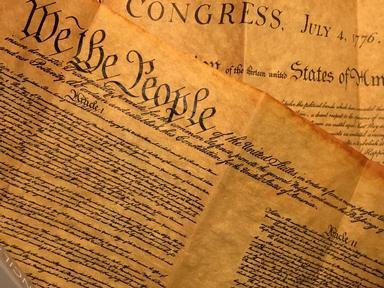Quiz Answer Key and Fun Facts
1. Who was the principal author of the US Bill of Rights?
2. Which of the following are NOT guaranteed by the First Amendment to the US Constitution?
3. Which Amendment to the US Constitution grants the right to keep soldiers from staying in your home?
4. When you "plead the Fifth", what right are you invoking?
5. When a police officer reads the Miranda Rights to a suspect ("You have the right to remain silent, you have the right to have an attorney present during any questioning, if you cannot afford an attorney one will be appointed for you free of charge"), the officer is informing the suspect of his Fifth and what other US Constitutional Amendment rights?
6. True or False: In part, the Second Amendment to the US Constitution says "the right of the people to keep and bear arms, shall not be infringed".
7. What does the Eighth Amendment to the US Constitution guarantee?
8. Which Amendment requires the police to get a search warrant (or consent of the owner) before searching private property?
9. True or False: A right to a trial by jury in civil matters is guaranteed by the Sixth Amendment to the US Constitution.
10. What does the Ninth Amendment to the US Constitution cover?
Source: Author
drowsteel
This quiz was reviewed by FunTrivia editor
stedman before going online.
Any errors found in FunTrivia content are routinely corrected through our feedback system.


